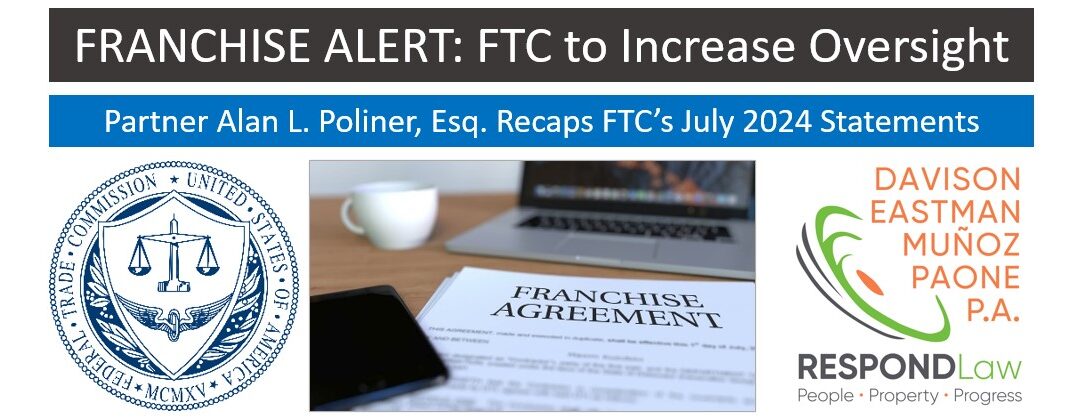On July 12, 2024, the Federal Trade Commission (FTC) issued several statements signaling a policy shift to increase the regulation of franchising.
First, the FTC issued a Policy Statement on the Franchisors’ Use of Contract Provisions including Non-Disparagement, Goodwill, and Confidentiality Clauses. The FTC was concerned that such clauses were being used to preclude franchisees from making reports to regulators or from providing information to prospective franchisees about their experience with a franchise system. The FTC stated that clauses that impair or prohibit free communication about potential law violations with an administrative agency acting within its statutory mandate are void and unenforceable.
The FTC concluded:
Clauses prohibiting franchisees from reporting potential law violations to the government are considered unfair and unenforceable. Further, the use of implicit or explicit threats to sue or otherwise retaliate against a franchisee who reports potential law violations to the government is also an unfair practice.
Second, the FTC issued Staff Guidance on the Unlawfulness of Undisclosed Fees Imposed on Franchisees. The FTC heard reports that franchisors were imposing previously undisclosed fees by making changes to the Operating Manual. Noting that The Franchise Rule requires franchisors to disclose in the FDD certain fees, the FTC guidance stated: “If a franchisor fails to disclose those fees in the FDD, such failure is a violation of the Franchise Rule and Section of the FTC Act.”
Third, the FTC released an Issue Spotlight on Risks to Small Business Success in Franchising which identified the top dozen concerns raised by Franchisees.
Their top 12 concerns were:
- Unilateral changes to franchise operating manuals
- Franchisor misrepresentations and deception
- Fees and royalties
- Franchise supply restrictions and vendor kickbacks
- Actual and feared retaliation
- Non-competes and no-poach clauses
- Franchise renewal problems
- Franchisor refusal to negotiate contract terms
- Franchise Disclosure Document issues
- Private equity takeovers
- Marketing fund transparency
- Liquidated damages clauses and early termination fees
Fourth, the FTC announced the reopening of the Request for Information on Franchise Agreements and Business Practices comment period until October 10, 2024.
The law firm of Davison Eastman Munoz Paone, P.A. is monitoring this shift in policy to assist clients and stakeholders in the franchise arena. For more information, contact firm partner Alan L Poliner, Esq.















